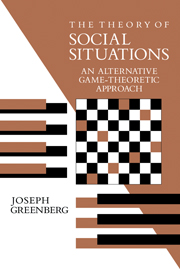Book contents
- Frontmatter
- Contents
- Preface
- 1 Overview
- 2 The theory of social situations
- 3 Examples
- 4 Abstract stable sets
- 5 Existence and uniqueness of OSSB and CSSB
- 6 Characteristic function form games
- 7 Normal form games
- 8 Extensive form games with perfect information
- 9 Infinitely repeated games
- 10 Implementation by means of situations
- 11 Closing remarks
- References
- Index
10 - Implementation by means of situations
Published online by Cambridge University Press: 05 June 2012
- Frontmatter
- Contents
- Preface
- 1 Overview
- 2 The theory of social situations
- 3 Examples
- 4 Abstract stable sets
- 5 Existence and uniqueness of OSSB and CSSB
- 6 Characteristic function form games
- 7 Normal form games
- 8 Extensive form games with perfect information
- 9 Infinitely repeated games
- 10 Implementation by means of situations
- 11 Closing remarks
- References
- Index
Summary
In this chapter the theory of social situations is applied to the problem of implementing a social choice rule. As was the case in the previous chapters, here, too, this application yields a new result within the implementation area itself – the characterization of social choice rules that satisfy the strong positive association condition (Definition 10.1.1) – and, in addition, sheds new light on this condition by pointing out its strategic (rather than normative) aspect.
Moreover, the methodology developed in this chapter is likely to prove useful in the important task of incorporating, into the theory of social situations, social environments where individuals have incomplete and/or imperfect information (in particular, about the preferences of the other players they are facing). (See also Section 11.9.)
Definition 10.0.1: A society is a triple (N,A,{ui}i∈N, where N is the set of individuals, A is the set of feasible social alternatives, and for i∈N, ui denotes individual i's utility function over A,ui:A→ℝ.
The problem of implementation concerns circumstances in which “the social planner” does not know the society he is facing. His knowledge is limited only to the class of “potential societies.” That is, although he does know the sets N and A, he has only partial information concerning the preferences of the individuals. Specifically, the social planner knows, for each i∈N, the set of utility functions, Ui to which “the true” preferences of individual i belong.
- Type
- Chapter
- Information
- The Theory of Social SituationsAn Alternative Game-Theoretic Approach, pp. 157 - 165Publisher: Cambridge University PressPrint publication year: 1990



